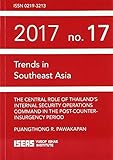The Central Role of Thailand's Internal Security Operations Command in the Post-Counter-insurgency Period / Puangthong R. Pawakapan.
Material type: TextPublisher: Singapore : ISEAS Publishing, [2017]Copyright date: ©2017Description: 1 online resource (34 p.)Content type:
TextPublisher: Singapore : ISEAS Publishing, [2017]Copyright date: ©2017Description: 1 online resource (34 p.)Content type: - 9789814786812
- 9789814786829
- 355.0330593 23
- online - DeGruyter
- Issued also in print.
| Item type | Current library | Call number | URL | Status | Notes | Barcode | |
|---|---|---|---|---|---|---|---|
 eBook
eBook
|
Biblioteca "Angelicum" Pont. Univ. S.Tommaso d'Aquino Nuvola online | online - DeGruyter (Browse shelf(Opens below)) | Online access | Not for loan (Accesso limitato) | Accesso per gli utenti autorizzati / Access for authorized users | (dgr)9789814786829 |
Frontmatter -- FOREWORD -- The Central Role of Thailand's Internal Security Operations Command in the Post-Counterinsurgency Period -- INTRODUCTION -- WHY ISOC? -- POLITICAL OFFENSIVE -- LEGAL LEGITIMACY DURING THE COUNTER-INSURGENCY PERIOD -- EXPANSION IN THE SEMI-DEMOCRATIC PERIOD -- ISOC IN ANTI-ELECTORAL POLITICS -- CONCLUSION -- REFERENCES
restricted access online access with authorization star
http://purl.org/coar/access_right/c_16ec
The Thai military's Internal Security Operations Command (ISOC) was in charge of a wide range of civil affairs projects during the country's struggle with the communist insurgency between the mid-1960s and the mid-1980s. These projects - including rural development programmes, mass organizations and mobilization campaigns, and psychological operations - provided justification for the military to routinely penetrate the socio-political sphere. Since the Cold War drew to a close, little attention has been paid to ISOC's role and power within the state apparatus. Since the coups of September 2006 and May 2014 that toppled the elected governments, ISOC has been dangerously empowered and increasingly employed by the military regimes to dictate the country's political direction. The power of the Thai military is exerted not only through its use of force but also by means of its socio-political arms. ISOC represents a potent tool with which conservative elites can undermine and control electoral democracy and through which the military can maintain its power.
Issued also in print.
Mode of access: Internet via World Wide Web.
In English.
Description based on online resource; title from PDF title page (publisher's Web site, viewed 24. Aug 2021)


